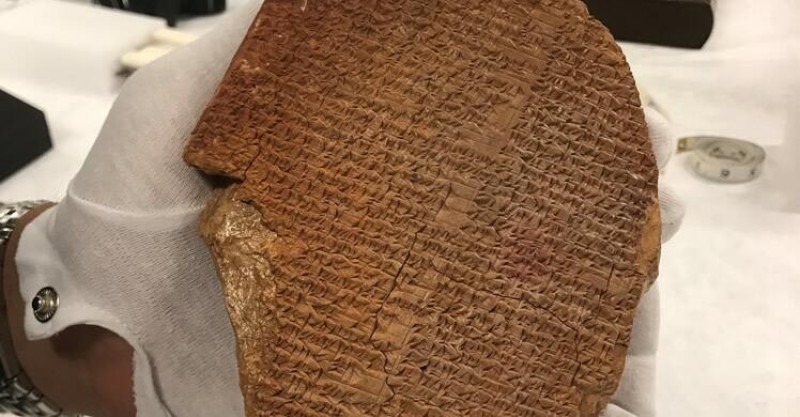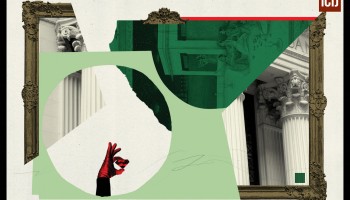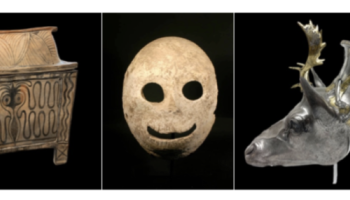The handover was announced by the Department of Justice last Tuesday and most of the artifacts departed the U.S. on Thursday with Iraqi Prime Minister Mustafa al-Kadhimi who met with President Biden in Washington D.C., Artnet reported.
The so-called “Gilgamesh Dream Tablet” has been at the center of an antiquities trafficking scandal stretching back over a decade.
Named because it’s inscription bears a portion of the legendary Epic of Gilgamesh, a Sumerian folk tale which is among the oldest recorded poems in human history, the clay tablet was first inscribed in the area of modern-Iraq some 3,600 years ago.
Ultimately the tablet found its way into the possession of Hobby Lobby, the U.S. based chain store whose evangelical Christian owners were bankrolling the Museum of the Bible in Washington D.C.
For years, the Green family, who owns the chain, had been buying up artifacts from across the near East, often with an unscrupulous disregard for provenance, to stock their new museum.
“In 2009, when I began acquiring biblical manuscripts and artifacts for what would ultimately form the collection at the Museum of the Bible, I knew little about the world of collecting,” Steve Green, President of Hobby Lobby, said in an apology statement in February, before returning some 11,000 artifacts he had acquired to Iraq.
“It is well known that I trusted the wrong people to guide me, and unwittingly dealt with unscrupulous dealers in those early years. One area where I fell short was not appreciating the importance of the provenance of the items I purchased,” he said.
How the Gilgamesh tablet ended up in Hobby Lobby’s hand is a long and twisting tale.
When the tablet was actually first dug up remains unknown, but its first surface on the global art market was when it was owned by a Jordanian antiquities dealer Ghassan Rihani, who sold it for US$50,000. As it shifted from auction house to auction house, its reputation and value grew as various false provenance papers were created for it. One story had it that it was found in a trove of bronze artifacts in 1981.
“This false letter traveled with the tablet as it was sold several times in different countries,” the DOJ statement said.
Eventually, it was purchased by Michael Sharpe Rare & Antiquated books, who sold it to Christie’s who ultimately sold it to Hobby Lobby for nearly $1.7 million.
Hobby Lobby is now suing Christies for a failure of due diligence.
Nonetheless, the U.S government has long maintained that the artifact was first imported to the U.S illegally.
“In 2003, a U.S. antiquities dealer (the Antiquities Dealer) purchased the Gilgamesh Dream Tablet, encrusted with dirt and unreadable, from the family member of a London coin dealer,” the DOJ said. “The Antiquities Dealer and a U.S. cuneiform expert shipped the tablet into the United States by international post without declaring the contents as required. After the tablet was imported and cleaned, experts in cuneiform recognized it as bearing a portion of the Gilgamesh epic.”
Forfeiture laws allow law enforcement in the U.S. to confiscate property or assets involved in a crime.
According to a primer a by the DOJ, forfeiture is a powerful tool for law enforcement officials to pursue in cases related to cultural property, especially those where the artifacts origin has clearly been falsified but the initial thieves or smugglers remain unknown.
“For most cultural property offenses, Congress has authorized both civil and criminal forfeiture.” the primer said. “If a painting was stolen by the Nazis in World War II, or an item looted from an archaeological site, it may not be possible to prosecute the thief, but we may be able to recover the property from the museum, collector, or auction house where it was found and return it to the family, tribe, or country, where it belongs.”
The trade of illicitly acquired artifacts and cultural property isn’t just a crime engaged in by wealthy collectors and museum curators, it’s a multi-billion dollar global industry according to a 2018 report on the industry by Standards Chartered Bank, and is often a major funding source for militant and organized criminal groups in the countries where the artifacts originate.
For example, in Iraq and Syria, the Islamic State group was well known to have made millions, if not billions, from their antiquities trafficking networks, all while they were ostensibly destroying cultural sites like the ruins of Palmyra in Syria or the tomb of the prophet Jonah in Mosul.
“The trafficking of cultural property and art is a lucrative criminal enterprise that transnational criminal organizations exploit to make a profit, regardless of its destructive consequence to cultures around the globe,” said Special Agent in Charge Peter C. Fitzhugh of Homeland Security Investigations in New York, said in the DOJ statement.
The looting of cultural property from active war zones, like Iraq which has been on and off in a state war since the 1980s, is also considered a war crime under the 1954 Hague Convention.






